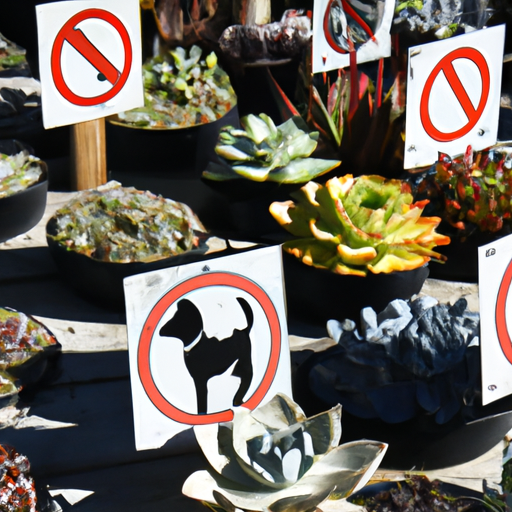As an avid plant enthusiast and a dog lover, you might have various types of plants in your home, including the popular succulents. Succulents are a versatile group of plants appreciated for their easy-care nature, unique shapes, and vibrant colors. But did you know some of these beautiful plants could be harmful to your furry friends?
Table of Contents
- Introduction to Succulents
- Common Succulents Poisonous to Dogs
- Aloe Vera
- Jade Plant
- Snake Plant
- Symptoms of Succulent Poisoning in Dogs
- What to Do If Your Dog Ingests a Poisonous Succulent
- Safe Succulents for Dogs
- Frequently Asked Questions
Key Takeaways
- Not all succulents are safe for dogs.
- Some common succulents like Aloe Vera, Jade Plant, and Snake Plant are toxic to dogs.
- Signs of succulent poisoning in dogs include vomiting, diarrhea, and lethargy.
- If your dog ingests a poisonous succulent, seek immediate veterinary care.
- There are many succulents safe for dogs, such as Hens and Chicks, Christmas Cactus, and Burro’s Tail.
Introduction to Succulents
Succulents are plants with fleshy leaves and stems that store water, making them incredibly resistant to drought. These plants are perfect for busy caregivers who might not have the time to regularly water their plants. While most succulents are safe for humans, not all are pet-friendly. In fact, as per the American Society for the Prevention of Cruelty to Animals (ASPCA), a number of them are toxic to dogs.
Common Succulents Poisonous to Dogs
Aloe Vera
One of the most popular succulents, Aloe Vera, is surprisingly harmful to dogs when ingested. While the gel is often used for its healing properties, the outer leaf contains aloin, a yellow latex that can cause vomiting and diarrhea in dogs.
Jade Plant
Known for bringing good luck, the Jade Plant is unfortunately not so lucky for dogs. Ingestion can lead to symptoms such as vomiting, slow heart rate, and depression.
Snake Plant
Snake Plants, also known as Mother-in-Law’s Tongue, contain saponins that can cause nausea, vomiting, and diarrhea in dogs. It’s best to keep this plant out of your pet’s reach.
Symptoms of Succulent Poisoning in Dogs
If your dog ingests a poisonous succulent, they may exhibit the following symptoms:
- Vomiting
- Diarrhea
- Lethargy
- Loss of Appetite
- Abnormal Urination
If you suspect your dog has ingested a toxic plant, seek immediate veterinary care. You can also consult a poison control center like the Pet Poison Helpline for immediate advice.
What to Do If Your Dog Ingests a Poisonous Succulent
The first step is to remove any remaining plant material from your dog’s mouth. If possible, identify the plant and contact your vet or a poison control center. They can provide guidance on the next steps, which may include inducing vomiting or providing activated charcoal to absorb the toxins.
Remember, it’s always better to prevent poisoning than to treat it. Keep potentially harmful plants out of reach or consider removing them from your home altogether. Find out more about poisonous plants and how to keep your pets safe on OneTopDog.
Safe Succulents for Dogs
If you’re a plant lover, don’t despair. There are plenty of succulents that are safe for dogs. These include:
- Hens and Chicks: These plants are non-toxic and safe for dogs.
- Christmas Cactus: Despite the name, this plant is not a true cactus and does not pose a threat to dogs.
- Burro’s Tail: This trailing succulent is safe for dogs and makes a beautiful addition to any home.
When choosing plants for your home, always research their safety for pets. You can find a comprehensive list of pet-friendly plants on OneTopDog.
Frequently Asked Questions
Q: Are all succulents poisonous to dogs?
No, not all succulents are poisonous to dogs. Some, like the Hens and Chicks and Christmas Cactus, are safe for pets.
Q: What should I do if my dog ingests a poisonous succulent?
Remove any remaining plant material from your dog’s mouth and contact a vet or poison control center immediately.
Q: Can I keep poisonous succulents if I have dogs?
Yes, but they should be kept out of reach of your pets. Alternatively, consider choosing pet-safe plants for your home.
Q: Where can I find a list of pet-safe plants?
You can find a comprehensive list of pet-friendly plants on OneTopDog.
In conclusion, while succulents are a popular choice for indoor plants, they aren’t always safe for our four-legged friends. As a responsible caregiver, it’s crucial to ensure that the plants in your home are safe for your pets. By doing so, you can create a pet-friendly environment that is also aesthetically pleasing.



